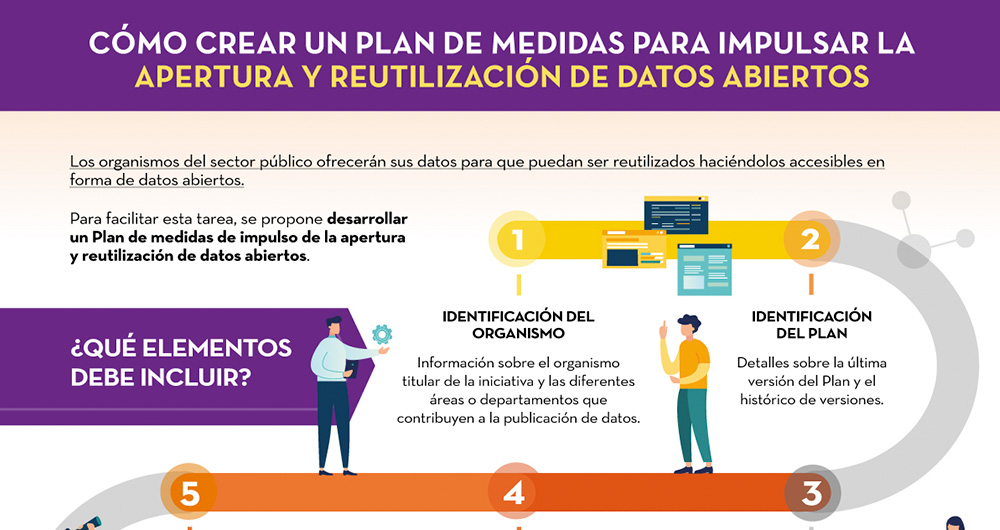
In today's digital age, data sharing and opendatahave emerged as key pillars for innovation, transparency and economic development. A number of companies and organisations around the world are adopting these approaches to foster open access to information and enhance data-driven decision making. Below, we explore some international and national examples of how these practices are being implemented.
Global success stories
One of the global leaders in data sharing is LinkedIn with its Data for Impactprogramme. This programme provides governments and organisations with access to aggregated and anonymised economic data, based on LinkedIn's Economic Graph, which represents global professional activity. It is important to clarify that the data may only be used for research and development purposes. Access must be requested via email, attaching a proposal for evaluation, and priority is given to proposals from governments and multilateral organisations. These data have been used by organisations such as the World Bank and the European Central Bank to inform key economic policies and decisions. LinkedIn's focus on privacy and data quality ensures that these collaborations benefit both organisations and citizens, promoting inclusive, green and digitally aligned economic growth.
On the other hand, the Registry of Open Data on AWS (RODA) is an Amazon Web Services (AWS) managed repository that hosts public datasets. The datasets are not provided directly by AWS, but are maintained by government organisations, researchers, companies and individuals. We can find, at the time of writing this post, more than 550 datasets published by different organisations, including some such as the Allen Institute for Artificial Intelligence (AI2) or NASAitself. This platform makes it easy for users to leverage AWS cloud computing services for analytics.
In the field of data journalism, FiveThirtyEight, owned by ABC News, has taken a radical transparency approach by publicly sharing the data and code behind its articles and visualisations. These are accessible via GitHub in easily reusable formats such as CSV. This practice not only allows for independent verification of their work, but also encourages the creation of new stories and analysis by other researchers and journalists. FiveThirtyEight has become a role model for how open data can improve the quality and credibility of journalism.
Success stories in Spain
Spain is not lagging behind in terms of data sharing and open data initiatives by private companies. Several Spanish companies are leading initiatives that promote data accessibility and transparency in different sectors. Let us look at some examples.
Idealista, one of the most important real estate portals in the country, has published an open data set that includes detailed information on more than 180,000 homes in Madrid, Barcelona and Valencia. This dataset provides the geographical coordinates and sales prices of each property, together with its internal characteristics and official information from the Spanish cadastre. This dataset is available for access through GitHub as an R package and has become a great tool for real estate market analysis, allowing researchers and practitioners to develop automatic valuation models and conduct detailed studies on market segmentation. It should be noted that Idealista also reuses public data from organisations such as the land registry or the INE to offer data services that support decisions in the real estate market, such as contracting mortgages, market studies, portfolio valuation, etc. For its part, BBVA, through its Foundation, offers access to an extensive statistical collection with databases that include tables, charts and dynamic graphs. These databases, which are free to download, cover topics such as productivity, competitiveness, human capital and inequality in Spain, among others. They also provide historical series on the Spanish economy, investments, cultural activities and public spending. These tools are designed to complement printed publications and provide an in-depth insight into the country's economic and social developments.
In addition, Esri Spain enables its Open Data Portal, which provides users with a wide variety of content that can be consulted, analysed and downloaded. This portal includes data managed by Esri Spain, together with a collection of other open data portals developed with Esritechnology. This significantly expands the possibilities for researchers, developers and practitioners looking to leverage geospatial data in their projects. Datasets can be found in the categories of health, science and technology or economics, among others.
In the area of public companies, Spain also has outstanding examples of commitment to open data. Renfe, the main railway operator, and Red Eléctrica Española (REE), the entity responsible for the operation of the electricity system ,have developed open data programmes that facilitate access to relevant information for citizens and for the development of applications and services that improve efficiency and sustainability. In the case of REE, it is worth highlighting the possibility of consuming the available data through RESTAPIs, which facilitate the integration of applications on data sets that receive continuous updates on the state of the electricity markets.
Conclusion
Data sharing and open data represent a crucial evolution in the way organisations manage and exploit information. From international tech giants such as LinkedIn and AWS to national innovators such as Idealista and BBVA, they are providing open access to data in order to drive significant change in how decisions are made, policy development and the creation of new economic opportunities. In Spain, both private and public companies are showing a strong commitment to these practices, positioning the country as a leader in the adoption of open data and data sharing models that benefit society as a whole.
Content prepared by Juan Benavente, senior industrial engineer and expert in technologies linked to the data economy. The contents and points of view reflected in this publication are the sole responsibility of the author.


